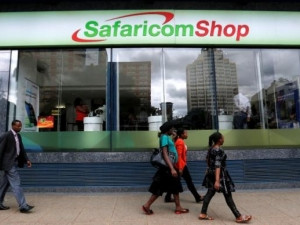
A proposal by Kenya's government to split Safaricom's mobile money platform, M-Pesa, from the business is "inconceivable thinking". This is according to Michael Joseph, Vodafone's director of mobile money and former Safaricom CEO, speaking to Bloomberg.
Jakoyo Midiwo, deputy minority leader in Kenya's national assembly, last month called for Safaricom to be broken up into pieces. He voiced concerns over job losses in Kenya's banking sector and called for government legislation to separate the business of telecommunications from that of banking, emphasising that successful mobile money platform M-Pesa is "not telecommunications, it is a banking activity".
"Our banks are collapsing and this House must act. Safaricom has had a free ride for far too long," he told the national assembly on 9 February. "The state must move in and divide Safaricom into several companies."
However, earlier this week, Kenya's information, communication and technology minister Joe Mucheru came out against the split, saying the move would punish operators for innovations and discourage investments.
"It will make Kenya a very unattractive destination for tech companies that want to come and innovate," he told Reuters.
Safaricom is 40% owned by UK-based Vodafone, while the Kenyan government owns 35% and the remaining 25% is publicly floated on the Nairobi Stock Exchange.
Plain stupid
Safaricom CEO Bob Collymore told reporters in Nairobi last month that the split proposal was "plain stupid" and would hurt Kenya's growth and restrict job creation.
"The economies of Africa need more big players. We don't believe anything we do today is anti-competitive. We don't believe dominance is a crime," Collymore said at the time.
Safaricom is by far the biggest telecoms firm in Kenya, with 26 million subscribers. It also dominates the mobile-based financial services sector because of M-Pesa.
Kenya's smaller operators have long argued Safaricom enjoys a dominant position because it accounts for around 90% of revenue in areas such as voice calls and text messages, and has over 65% of the country's 40 million mobile phone subscribers. The rest of the subscribers are shared between the local units of India's Bharti Airtel and Orange ? the French company which last year agreed to sell its Kenyan mobile phone business to London-based Helios Investment Partners.
Midiwo aims to force the group to run M-Pesa as a separate business to its telecoms service but Mucheru told Reuters government is "not for that in any way", adding it is up to telecoms operators to decide if they want to spin off parts of their businesses.
Safaricom is also facing a separate proposal to be broken up in a leaked draft report on competition in the sector, done by consultancy Analysys Mason. The report was commissioned by the Communications Authority of Kenya after persistent complaints by smaller rivals over Safaricom's dominance. The authority has yet to comment on the Analysys Mason report, saying it is still reviewing it.
According to Bloomberg, the report recommends Safaricom opens up M-Pesa to transfers from competitors' services at prices determined by the regulator.
"The whole idea that you want to split a company up because it is successful to me is just completely ridiculous. You are punishing success. Why would you do that?" Joseph, who founded M-Pesa a decade ago when he was Safaricom's CEO, told Bloomberg.
10 years of M-Pesa
On Monday, M-Pesa celebrated its 10th birthday. The money transfer platform was launched in Kenya in March 2007 and is now active in 10 countries: Albania, the Democratic Republic of Congo (DRC), Egypt, Ghana, India, Kenya, Lesotho, Mozambique, Romania and Tanzania.
As of the end of December 2016, M-Pesa had served almost 29.5 million active customers through a network of more than 287 400 agents. Vodafone says during 2016, the service processed around six billion transactions, peaking in December at 529 transactions every second.
According to Safaricom's annual report for 2016, M-Pesa had 24 million registered customers in Kenya, with 30-day active customers sitting at around 16.6 million. Safaricom's M-Pesa revenue also grew by 27% to 41.5 billion Kenyan shillings (R5.3 billion) for the year ended 31 March 2016.
South Africa-based Vodacom, which is 65% owned by Vodafone, has around 10.9 million customers using M-Pesa in its operations in Tanzania, Mozambique, DRC and Lesotho. However, it pulled the plug on the mobile money offering in SA last July.
Share